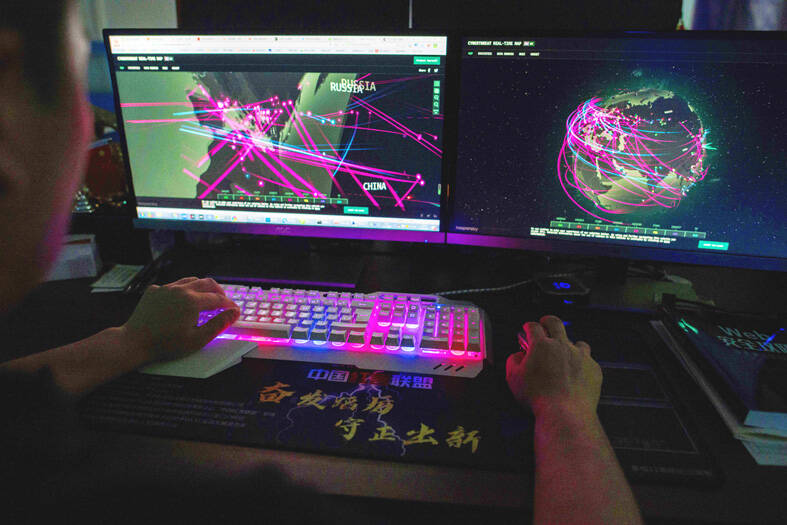The Administration for Cybersecurity would focus on bolstering cybersecurity for key infrastructure in its four-year policy direction plan to be decided next month, administration director Tsai Fu-long (蔡福隆) said.
President William Lai (賴清德) on March 13 introduced 17 major strategies to respond to five major national security and “united front” threats Taiwan faces. The five major security threats are: China’s threats to national sovereignty, espionage activities targeting the military, attempts at obscuring Taiwanese’s national identity, “united front” efforts to infiltrate society through cross-strait exchanges, and so-called “integrated development” aimed at attracting Taiwanese businesspeople and youth.
“One of the administration’s tasks is to conduct in-depth cybersecurity testing on key infrastructure, such as finance and healthcare, to prevent Chinese hackers from taking advantage of weaknesses to launch attacks,” Tsai said during an exclusive interview with the Liberty Times (sister paper of the Taipei Times) on March 27.

Photo: AFP
Denial-of-service attacks tend to attract great attention and are often used as a diversion, he said, adding that security experts are more concerned about those who invade and lurk in critical infrastructure.
“After sneaking in, they stay low to avoid being discovered and only launch attacks when necessary,” Tsai said.
Critical infrastructure refers to facilities related to the operation of the government and people’s livelihoods, including finance, transportation or medical care, he said.
“For example, if a bank is hacked, people may find themselves unable to withdraw money,” Tsai said. “If a hospital is hacked, it could delay medical care for those in a critical condition, and if a railway system is hacked, it could lead to train collisions.”
Therefore, in-depth inspections of critical infrastructure are crucial, so that those hiding within could be detected and removed before they cause harm, he said.
The information security of news organizations should also be bolstered to prevent hackers from attacking the media and spreading false information to affect the public’s morale during emergencies, he added.
Another focus would be to improve cybersecurity at listed companies, which would also spur demand for cybersecurity products and services, resulting in a positive cycle, he said.
“Some cybersecurity professionals have suggested that the government should take stock of the key technologies the country must master to ensure that Taiwan can be self-sufficient and not rely on foreign countries in the event of war or crisis,” Tsai said.
The administration would keep abreast of global trends in the cybersecurity industry through international research organizations, and use its findings to identify technologies that have fewer international suppliers, he said, adding that doing so could help Taiwan find its market niche and spur the development of that industry.
It would also encourage enterprises to invest more in information security, particularly focusing on Taiwan’s nearly 2,000 listed and over-the-counter companies, he said.
Cybersecurity would form an important component of supply chain management, Tsai said.
Taiwan Semiconductor Manufacturing Co has provided a good model for such measures, which has led to upstream and downstream industries strengthening their cybersecurity, he said.
Moving forward, the administration would work with associations to encourage more industry leaders to prioritize cybersecurity and jointly develop supply chain security standards, Tsai said.
In the second half of the year, the administration would launch a program aimed at identifying vulnerabilities in information and communications technology (ICT) products, he said, adding that it would call on manufacturers to work with white hat hackers to test ICT products and that it would reward those who find vulnerabilities.

Taiwanese can file complaints with the Tourism Administration to report travel agencies if their activities caused termination of a person’s citizenship, Mainland Affairs Council Minister Chiu Chui-cheng (邱垂正) said yesterday, after a podcaster highlighted a case in which a person’s citizenship was canceled for receiving a single-use Chinese passport to enter Russia. The council is aware of incidents in which people who signed up through Chinese travel agencies for tours of Russia were told they could obtain Russian visas and fast-track border clearance, Chiu told reporters on the sidelines of an event in Taipei. However, the travel agencies actually applied

Japanese footwear brand Onitsuka Tiger today issued a public apology and said it has suspended an employee amid allegations that the staff member discriminated against a Vietnamese customer at its Taipei 101 store. Posting on the social media platform Threads yesterday, a user said that an employee at the store said that “those shoes are very expensive” when her friend, who is a migrant worker from Vietnam, asked for assistance. The employee then ignored her until she asked again, to which she replied: "We don't have a size 37." The post had amassed nearly 26,000 likes and 916 comments as of this

New measures aimed at making Taiwan more attractive to foreign professionals came into effect this month, the National Development Council said yesterday. Among the changes, international students at Taiwanese universities would be able to work in Taiwan without a work permit in the two years after they graduate, explainer materials provided by the council said. In addition, foreign nationals who graduated from one of the world’s top 200 universities within the past five years can also apply for a two-year open work permit. Previously, those graduates would have needed to apply for a work permit using point-based criteria or have a Taiwanese company

The Shilin District Prosecutors’ Office yesterday indicted two Taiwanese and issued a wanted notice for Pete Liu (劉作虎), founder of Shenzhen-based smartphone manufacturer OnePlus Technology Co (萬普拉斯科技), for allegedly contravening the Act Governing Relations Between the People of the Taiwan Area and the Mainland Area (臺灣地區與大陸地區人民關係條例) by poaching 70 engineers in Taiwan. Liu allegedly traveled to Taiwan at the end of 2014 and met with a Taiwanese man surnamed Lin (林) to discuss establishing a mobile software research and development (R&D) team in Taiwan, prosecutors said. Without approval from the government, Lin, following Liu’s instructions, recruited more than 70 software